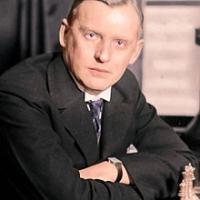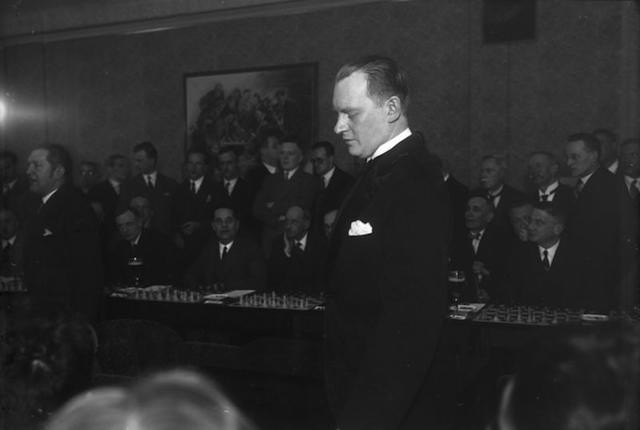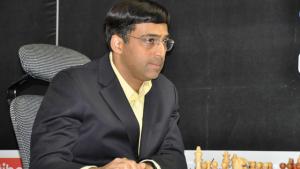
Clash of Champions: Alekhine vs. Euwe (1937 Rematch)
After winning the world championship title from Alexander Alekhine in 1935, Max Euwe did something rare -- he voluntarily gave his opponent a rematch, without putting obstacles in the way or seeking a weaker opponent to play first.
The rematch took place in Holland in 1937.
It may be hard to believe now -- since Alekhine is seen as one of the best players ever -- but at the time, Euwe was considered a strong favorite. The public did not rate Alekhine's chances too highly because he was seen as a washed-up alcoholic.
But there was something that neither the public nor Euwe knew: in the intervening years, Alekhine had bought a cow.

Not Alekhine's cow: image via Wikipedia
What this meant was that Alekhine was drinking fresh milk, straight from that cow, rather than his usual vodka, whiskey, or whatever.
It also meant something more. Alekhine was coming to the second match full of determination, having worked on himself and no longer underestimating Euwe. He knew that if he failed to regain the title, he would go down in history as no more than a bit player; he would lose his legacy of greatness.
Alekhine had worked too hard climbing to the world championship to throw it away.
"Allein-Ich," as he was sometimes jokingly called ("I am alone" in German), showed that he could wake from his slumber and be once more the chess god he had been before.
At first, it seemed like the champion would retain his title, as Euwe won the first game. However, Alekhine bounced back in the very next game. After two draws, Euwe won another game, giving him the lead after five games.

Alekhine-Euwe 1937 via wikipedia
But then came a game which can be described as the turning point of the match, even though it came fairly early -- in the sixth game of what ended up being a 25-game match.
In the following position:
Alekhine played the shocking piece sacrifice 6.Nf3!!? (Actually it was the previous move, 5.Bxc4, which was the shocker, since at this point there is no other option for White, but never mind that.)
And Euwe, after long thought, declined the sacrifice and instead played 6...b5?, which was immediately refuted by 7.Nxb5! (if 7...cxb5 8.Bd5 wins the exchange). I believe this was a huge turning point in the match and -- although just equalizing the score -- it put Euwe on the back foot psychologically.
Alekhine won the following two games, and after a single draw, he won again, giving him a three-point lead.
Later it was shown that the sacrifice could have been accepted, and with very precise play Euwe could have shown Alekhine's sacrifice to be found wanting. But what is done is done.
After the match, Euwe -- always objective and never one to be hampered by his own ego -- thoroughly praised Alekhine's play:
"Alekhine's perfect technique and combinative talent are so well known that it is unnecessary to talk about them. His conduct of the endgame was shining. Even so, I admire most how he finished the adjourned games. I had to analyze them, too, so I know them well. When I think of how my opponent created ingenious ideas and how he finished them in unexpected ways, I have only the greatest admiration for Alekhine's playing style."

Alexander Alekhine: image via Wikipedia
We will now see an example of this ingenious endgame play by Alekhine from the 24th game of the match. At this point, the match was nearly over, but Alekhine had to win two more games to take back his title.
In this game, we will see a minor inaccuracy by Euwe in a benign opening variation is harshly punished by Alekhine, with instructive play.
Not long after this match ended, the world once again convulsed into war, and Alekhine never had another chance to defend his title. He became the first world champion to pass away while holding the title when he died at the age of 53 in a hotel on the coast of Portugal, where he was staying as he sought a new home.
He had just come to terms on a match with Botvinnik, which was never to happen.
The 1948 world championship was therefore decided by a tournament. It was a five-player round-robin tournament held half in The Hague and half in Moscow.
Next week, we will see some endgames from that tournament.
RELATED STUDY MATERIAL
- Read the previous article in this series, Euwe vs. Alekhine.
- Watch GM Dejan Bojkov's incredible greatest chess minds video series on Alekhine.
- Play a match between Alekhine and Euwe in the Chess Mentor.
- Practice your world-championship-level combinations in the Tactics Trainer.
- Looking for articles with deeper analysis? Try our magazine: The Master's Bulletin.

